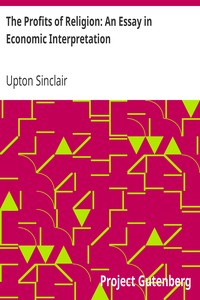The Profits of Religion: An Essay in Economic Interpretation by Upton Sinclair
"The Profits of Religion: An Essay in Economic Interpretation" by Upton Sinclair is a critical analysis written in the early 20th century. This work examines religion from an economic perspective, arguing that it serves as both a source of income for clergy and a tool for maintaining social privilege and oppression. Sinclair uses evocative and satirical language to critique how institutionalized religion exploits its followers, connecting spiritual beliefs to financial gain and
societal control. The opening of the book introduces the concept of "Bootstrap-lifting," a metaphor for how individuals labor under the illusion of spiritual elevation while being victimized by those who profit from their beliefs. Sinclair vividly describes a scene where people strain to lift themselves by their bootstraps, while a pickpocket reaps the rewards of their distraction. This introduces a series of critiques regarding various religious practices, asserting that many so-called spiritual exercises distract from the material realities of life and facilitate exploitation. Through these observations, Sinclair sets the stage for a broader examination of religious institutions as impediments to social progress, establishing a provocative foundation for his economic critique of culture. (This is an automatically generated summary.)
Read now or download (free!)
| Choose how to read this book | Url | Size | ||||
|---|---|---|---|---|---|---|
| Read online (web) | https://www.gutenberg.org/ebooks/1558.html.images | 591 kB | ||||
| EPUB3 (E-readers incl. Send-to-Kindle) | https://www.gutenberg.org/ebooks/1558.epub3.images | 311 kB | ||||
| EPUB (older E-readers) | https://www.gutenberg.org/ebooks/1558.epub.images | 321 kB | ||||
| EPUB (no images, older E-readers) | https://www.gutenberg.org/ebooks/1558.epub.noimages | 291 kB | ||||
| Kindle | https://www.gutenberg.org/ebooks/1558.kf8.images | 673 kB | ||||
| older Kindles | https://www.gutenberg.org/ebooks/1558.kindle.images | 616 kB | ||||
| Plain Text UTF-8 | https://www.gutenberg.org/ebooks/1558.txt.utf-8 | 512 kB | ||||
| Download HTML (zip) | https://www.gutenberg.org/cache/epub/1558/pg1558-h.zip | 301 kB | ||||
| There may be more files related to this item. | ||||||
Similar Books
About this eBook
| Author | Sinclair, Upton, 1878-1968 |
|---|---|
| Title | The Profits of Religion: An Essay in Economic Interpretation |
| Note | Reading ease score: 61.4 (8th & 9th grade). Neither easy nor difficult to read. |
| Credits | Produced by Charles Keller and David Widger |
| Language | English |
| LoC Class | BL: Philosophy, Psychology, Religion: Religion: General, Miscellaneous and Atheism |
| Subject | Christianity -- Controversial literature |
| Category | Text |
| EBook-No. | 1558 |
| Release Date | Dec 1, 1998 |
| Most Recently Updated | Apr 2, 2015 |
| Copyright Status | Public domain in the USA. |
| Downloads | 388 downloads in the last 30 days. |
| Project Gutenberg eBooks are always free! | |

